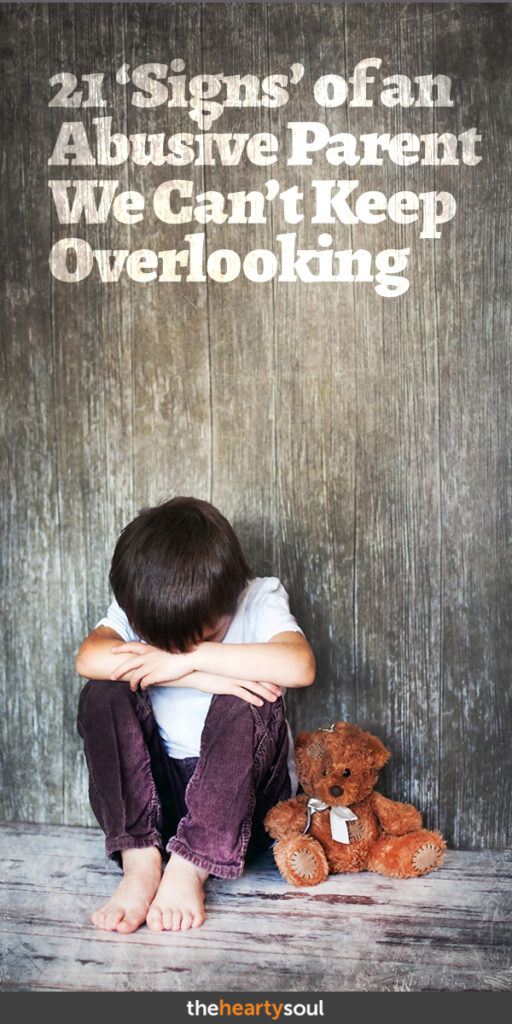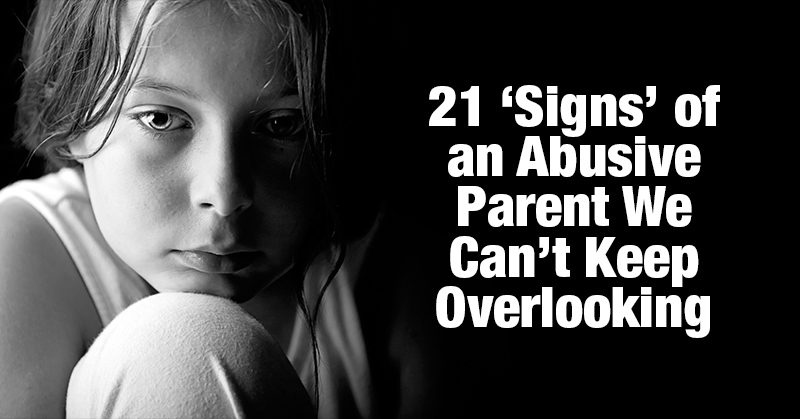The signs of abuse can often be hard to see, especially when the abuser is a parent. Not only may people outside of the situation not see the signs, but it can be years before the child recognizes the abuse. These are some of the signs that you or someone you know has an abusive parent.
21 Signs of an Abusive Parent

We tend to think of abusive parents as purely physical, however emotional and mental abuse is just as common, if not more so, and have a negative impact on a child’s mental health long into adulthood. These are just some of the signs that either you or someone you know is a victim of parental abuse. (1)
1. The use of basic necessities as leverage

Using necessities as a way to control – whether by withholding or threatening to withhold them or by saying “At least I give you “x” thing” as a way to make the child feel bad or to justify the parent’s behavior. (1) Basic necessities include:
- Food
- Water
- Shelter
- Clothes
- Hygiene products
This can also be the lack of physical abuse (“At least I don’t beat you!”). The basic things a child needs to live should not have to be earned, nor should they be used as a threat or blackmail to coerce the child into doing what the parent wants. (1)
Read More: Why We Shouldn’t Force Our Kids to Have Relationships With Emotionally Abusive Relatives
2. Parentification

This is a term for when a parent treats their child more like an adult friend and lies heavily on them for emotional support. It is almost a role reversal, where the child is now taking care of the parent’s needs instead of the other way around. This not only blurs lines for the child on healthy interpersonal boundaries, but it can also lead them to believe that anything bad that happens to their parent is the child’s fault. (1)
3. Child Favoring

Parents are supposed to love their children equally and for the unique qualities, each of them has. Favoring one over the other damages both children: One grows up with an inflated sense of self, the other believing that they are worthless and undeserving of love and attention. (1)
4. Teasing and Humiliation

Sure, sometimes as family members we light-heartedly tease one another. When a parent teases, shames, and humiliates their child incessantly, however, this becomes psychologically damaging. (1)
5. Denying Privacy

Disguised as wanting to “protect” their child, not giving them any privacy shows a complete lack of trust and disregard for their right to their own space. (1) Lack of privacy can include:
- Room raids
- Phone raids
- Being denied items such as a bedroom door
Children who are given no trust and no privacy grow up to be untrusting of others. (1)
6. Threatening Physical Violence

Though the parent never actually goes through with that threat, it is a fear tactic that has negative effects on the child. It will also make them afraid to go to their parent if they have problems and can cause issues of fearing authority figures. (1)
7. Forced Competition Between Siblings

This is the idea that parental love must be earned rather than freely and equally given. In this case, siblings are put against one another to compete for their parent’s love, and each one is led to believe that the other is loved more than they are. (1)
8. Religious Shame

Using religion to shame a child does double damage, because not only is the parent disappointed in you, but now so is God (or the religion’s version of God), who is also often seen as a religious father figure. (1)
9. Emotional Neglect

This is not what a parent does, but more what they don’t do. Even if they are physically present, they are mentally or emotionally absent, perhaps they even completely ignore their children. Being a good parent is more than just providing a child with the basic necessities of life. It is also being an active and positive participant in their lives. (1)
10. Conditional Love

Only showing your child love and affection when they do something good and denying them of it when they are “bad” teaches the child that love must be earned. It enforces the idea that if they do something wrong, they are undeserving of love. (1)
11. Using a child as leverage against the other parent

Marital problems should always be dealt with between the parents and not in front of their children. More importantly, children should not be used as a means of “getting back” at the other parent. (1) This can look like:
- Tell your mom/dad this…
- Your mom is this…
- Your dad is that…
Children should not be pushed to choose between their parents or used as a prize to be won during a divorce. (1)
Read More: Half of Singles Don’t Want a Relationship or Even a Date
12. Expecting Perfection

No matter how smart, talented, or hard-working a child is, they will never be perfect. Refusing to accept anything less or being a “helicopter parent” causes children to become highly self-critical, destroys their self-confidence, and causes unnecessary stress and anxiety. (1)
13. Guilt-tripping

Being constantly made to feel guilty by parents or other adult authority figures stunts a child’s ability to learn what healthy boundaries are and how to assert them. It is unfair, exploitative, and an abuse of the parent-child power dynamic. (1) This can cause (1):
- Difficulty with self-expression
- Low self-esteem and confidence
- Anxiety and depression
- The constant fear of getting in trouble
14. Blaming

This is when a parent always plays the victim and blames the child for everything that goes wrong. In these scenarios, the parent is never wrong and the child always is. This teaches the child to never take ownership when they have done something wrong and can lead to them repeating this behavior as they grow up. (1)
15. Always speaking for the child

Children should be taught to speak up for themselves and also made to feel safe to express their own needs, fears, and desires. A parent who constantly interrupts and speaks for the child when they are speaking to another adult not only takes that away, but it can also be a sign that there are other types of abuse going on and the parent is afraid of being exposed. (1)
This can also lead to consent being given by a parent on behalf of a child when in reality that child is uncomfortable and does not want to do what is being asked of them. They are essentially being taught that they don’t have the right to say no and that they must always do what is asked of them, no matter what. (1)
16. Verbal Abuse as Discipline

Constant verbal abuse, ridicule, and yelling at a child make them more likely to develop personality disorders as they grow older. (2)
17. Emotion-Shaming

Telling a child to stop crying or that they are being too sensitive teaches them that their feelings aren’t valid, that they overreact about everything, and that they should keep negative emotions to themselves instead of talking about them with someone they trust. (1)
Read More: Couple Saves Life of Malnourished Homeless Vet, Discovers He’s Been Missing for 40 Years
18. Violating Age-Appropriate Boundaries

This goes along with denying privacy: It is not a parent’s “right” to deny a child the boundaries they wish to set for themselves. This could be things like keeping their door closed while changing, sleeping, etc, or being allowed to have private conversations. (1)
19. Invalidating a Child’s Struggles

This often comes in the form of “Back in my day, we had it so much worse…”. This is especially dangerous when it is used to justify parental abuse, such as telling a child they are lucky that they aren’t punished as harshly as they were by their own parents. (1)
20. Stealing from the Child

Stealing both items and money from their child because they are the parent and have a “right” to it is wrong, especially if that is money that the child earned. This teaches the kids that they “owe” their parents for things like food, clothes, and a place to sleep and that they don’t have the right to protect any of their own belongings. (1)
21. Forcing a child to be who the parent wants

Most parents want the best for their children and want to see them succeed. This becomes abusive when that definition of success and what’s best for the child is defined only by the parent with no input for their kid. (1) This can look like (1):
- Being forced to play the sports/do the activities that the parent did or likes
- Being forced to go to the same school as the parent or take the same program (and threatening to withdraw financial support otherwise)
- Pushing/forcing the child into a career or life based on what the parent wants without considering the child’s likes, dislikes, and dreams for their life
A parent should be proud of their child for following their passions and doing what makes the child happy, not only if they follow a path that the parent deems “respectable” or praise-worthy. (1)
The signs of a mentally and emotionally abusive parent can be hard to see, especially for the victim who grew up not knowing anything different. If you have been the victim of an abusive parent, know that it is never too late to get professional help to help you heal from the psychological damage your actions may have taken.
Read More: Store Gave a Job to Homeless Woman Who Slept in Their Parking Lot: ‘I Wish We Had 120 Like Her!’


